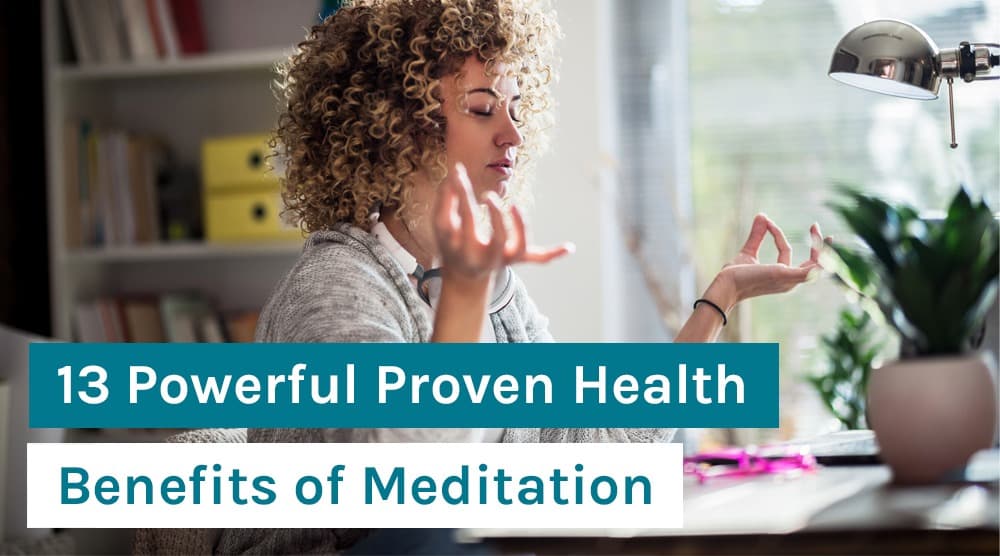13 Powerful Proven Health Benefits of Meditation
In a hurry? Click here to read the Article Summary...
There are a great many science-backed health benefits attributed to meditation. While the practice itself is ancient, research into and interest in meditation has seen huge growth over the last three decades. That’s because, quite simply, it works extremely well for a number of issues with which we humans must deal. In this article, you’ll learn what the research has found about the health benefits of meditation, as well as some helpful tips on how to get started if you’re not currently meditating.

Meditation is many things to many people but put simply, it is the practice of focusing the mind, bringing it to the present moment, and calming and redirecting thoughts to achieve a more calm and stable emotional state.
By doing this, many wonderful things (including improved health) can be achieved. Here are 13 of our favorite health benefits of meditation…
#1. Meditation Reduces Inflammation
Chronic inflammation is known to be a substantial contributing factor to most diseases and health problems. Meditation has been shown to improve inflammatory conditions, which it does primarily by reducing stress.
Psychological stress is correlated with chronic inflammatory conditions. The cascade of stress hormones released in response to stressful situations is highly inflammatory. So it just makes good sense that a holistic approach to dealing with inflammation would be to combat stress.
A 2013 study [1] examined the benefits of an 8-week mindfulness meditation-based stress reduction course. Researchers found a significantly smaller post-stress inflammatory response for those meditating than for those who did not. Going back further, a 2003 study [2] found that meditation decreased inflammatory biomarkers and increased anti-inflammatory cytokines.
#2. Meditation May Reduce Blood Pressure

A 2017 review of medical research [3] found that transcendental meditation (TM) helped to reduce both systolic and diastolic blood pressure. Researchers concluded that practicing TM could potentially reduce systolic blood pressure by ~4mm Hg, and diastolic blood pressure by ~2mm Hg.
Another 2017 review of medical studies [4] investigated the effects of both TM and other forms of meditation on blood pressure. Researchers found that other forms of meditation performed even better than TM in reducing both diastolic and systolic blood pressure.
In yet a third 2017 study [5], it was determined that meditation improved blood pressure in study participants, particularly for those over the age of 60.
#3. Meditation Improves Immune Function and Gut Microbiome
Meditation has an interesting effect on the immune system and the gut microbiome.
A 2017 review of medical studies [6] investigated the benefits of meditation on various factors, including immunity. Researchers found that meditation improved T-cell count and activity for those diagnosed with HIV and breast cancer.
Another 2017 study [7] found that meditation helped to regulate stress response, thereby suppressing chronic inflammation and helping to maintain a healthy gut-barrier function and gut microbiome. With up to 80% of the immune system being located in the gut, this is significant!
#4. Meditation Reduces Stress
Anyone who meditates regularly knows that it is without comparison for reducing stress, which many studies have confirmed. A 2005 study [8] found that meditation reduced stress and anxiety for nurses, known to have a significant degree of job-related stress in a high-pressure work environment.
A 2014 study [9] investigated the impact of meditation on family caregivers of people with dementia – a stressed group of people if ever there was one. They found that meditation decreased depression and burden in this group.

Cancer patients also benefit from meditation. A 2000 study [10] found that meditation significantly eased stress and negative thoughts, anger, depression, and anxiety in cancer patients.
A 2019 study [11] published in the journal Psychoneuroendocrinology sought to discover the mechanisms by which meditation improved stress. Researchers found that long-term meditators had faster cortisol recovery from stress, and experienced more positive emotions after exposure to stress. They also found that long-term meditators adapted better, were able to regulate emotions better, and spent less time catastrophizing (worst case scenario thinking).
#5. Meditation Helps Relieve Pain
For thousands of years, Buddhist monks have known that the practice of meditation could significantly alter the subjective experience of pain. Science is starting to catch up with this ancient knowledge.
A 2008 study [12] of chronic low back pain sufferers over the age of 65 found that meditation helped in a variety of ways. For some, it was the mental distraction that assisted with pain relief. Others coped better with the pain they had, stating “I still have the same back pain but am coping with it much better.” Some had a direct reduction of pain and many reported sleeping better, which is always beneficial for chronic pain sufferers.
A small clinical trial reported in 2018 [13] found that those who used meditation had an increase in pain tolerance, and a decrease in pain intensity after a single meditation experiment, compared with the control group.
A 2011 study [14] reported in the journal Neuroscience sought to discover how meditation influences the sensory experience of pain in the brain. Researchers found that meditation engages multiple brain mechanisms that alter the perception of pain and unpleasantness of pain messages received from the nervous system.
#6. Meditation Helps to Ease Anxiety
Described in one study [15] as “the cognitive state related to the inability to control emotional responses to perceived threats,” anxiety is rampant in today’s society. Meditation has been found to ease anxiety in several clinical trials.
A 2014 trial [15] used functional magnetic resonance imaging (fMRI) technology to see how the anxious brain responded to meditation. Researchers found that 20 minutes of meditation reduced anxiety from 15% to 22% in otherwise healthy participants, and this occurred each time meditation was practiced. Meditation activated several key areas of the brain and reduced anxiety by engaging brain mechanisms involved in sensory evaluation and the cognitive control of emotions.

A 2014 review of clinical studies [16] also found that meditation worked well for anxiety. Researchers stated that meditation was “comparable with what would be expected from the use of an antidepressant in a primary care population, without the associated toxicities.” Another 2014 review of studies on transcendental meditation [17] found that it had good effects on anxiety, and especially for patients with chronic anxiety, veterans with post-traumatic stress disorder, and prison inmates.
Meditation has also been shown to reduce symptoms of disorders associated with anxiety such as paranoid thoughts, phobias, social anxiety, obsessive-compulsive disorder, and panic attacks [18].
#7. Meditation Eases Depression
A 2014 study [16] examined the results of 47 clinical trials on meditation with over 3,300 participants. Researchers found that meditation did indeed help to relieve symptoms of depression. In a study reported in Complementary Therapies in Clinical Practice [19], Indian scientists discussed the methods by which meditation changes the depressed brain. For instance, meditation increases neurotransmitters such as GABA, melatonin, and 5-HT. It decreases levels of cortisol and increases DHEA levels.
Meditation also increases activity in the parasympathetic nervous system (which promotes resting and digesting), decreases levels of pro-inflammatory cytokines, and increases levels of anti-inflammatory cytokines. Taken together, all of this has a marked effect on the brain of a depressed individual. With all of this going on, it is easy to see how powerful meditation can be for easing depression.
#8. Meditation Improves Sleep
A 2015 review of medical studies [20] found that meditation reduced the amount of time it took meditators to fall asleep, increased total sleep time and had long-lasting effects.
According to one 2016 study [21], the longer you practice meditation, the better your sleep results, too. In this study, well-practiced meditators showed enhanced slow wave and REM sleep, a reduced number of awakenings during the night, and reduced duration of non-REM sleep.

Does meditation work as well as pharmaceutical drugs for chronic insomnia? A 2011 study [22] investigated that very question. The objective of the study was to determine if a mindfulness-based stress reduction (MBSR) program could help patients with chronic insomnia. Researchers split participants into two groups, one group used MBSR prior to sleep, while the second group was given a drug called Lunesta (eszopiclone).
It was found that both groups enjoyed significant improvements in sleep. Interestingly, however, over half of the MBSR group had recovered from chronic insomnia after five months of using meditation, and that number was considerably higher than the group using the drug.
Meditation was found to help insomniacs recover from chronic insomnia much better than the pharmaceutical drug, by giving them techniques to manage their thoughts and reduce stress. All this with no harmful side effects!
#9. Meditation May Help Control Addictive Behaviors
This is a reasonably complex subject due to the fact that there are many addictive behaviors and the reasons for having these behaviors differ. In a nutshell, however, meditation appears to stimulate the brain for that feeling of a natural high, without the need for addictive substances in order to feel good [23]. Also, when meditating, the slower brain waves that are induced are the same brain waves that are used by doctors in biofeedback therapy to treat addictions.
Studies have found that when an addict gets their “fix” (whatever that might be), the neurotransmitter dopamine is released, thus providing that feeling of euphoria. Meditation does the same thing [24]!
Another outcome that occurs with certain styles of meditation is that the mind is trained to simply step aside when addictive thoughts occur, and this frequently occurs when a person is stressed. So by helping to attenuate stress, meditation can be a huge benefit here too.
A particularly convincing 2006 study [25] found that meditation worked well for 78 substance-addicted prison inmates. For 10 days the inmates were taught meditation and then given diaries to record the results. After three months, the inmates who practiced meditation reported using 89% less marijuana and drinking 87% less alcohol. Researchers stated that meditation was nearly six times more effective than the traditionally used chemical dependency treatment plan.
#10. Meditation Helps to Generate More Positive Feelings
For those who struggle with negativity – especially toward themselves – meditation has demonstrated benefits. A 2014 review of 22 medical studies [26] found that meditation improved compassion toward others, self-compassion, and positive emotions.
A 2011 article appearing in the journal Clinical Psychology Review [27] discussed the merits of loving-kindness and compassion meditation. Neuroimaging studies showed that loving-kindness meditation and compassion meditation activated areas of the brain involved in the processing of emotions and empathy.

These two disciplines were especially useful when combined with other therapies such as cognitive behavioral therapy when targeting problems that involve interpersonal processes such as marital conflict, social anxiety, anger, and being a long-term caregiver.
#11. Meditation Improves Brain Health and Cognition
Keeping a flexible mind – an ability to engage in less rigid thinking – is associated with many benefits, not the least of which are improved interpersonal relationships and better problem-solving skills. A 2012 study [28] found that experienced meditators scored significantly lower mind rigidity scores than non-meditators.
Multi-tasking can be stressful. It’s something that most of us are required to do these days, whether we are mothers of small children or busy executives. A 2011 study [29] placed participants into three groups. One group receiving eight weeks of meditation training, one receiving eight weeks of instruction in body relaxation techniques, and one group receiving neither.
The three groups were then given a stressful, multi-tasking test. Who fared best? The meditation group had the lowest levels of stress, better memory for the tasks they performed, switched tasks less often and were able to stay focused on their tasks for longer.
Cognitive skills also improve with meditation. A 2010 study [30] found that just four days of meditation training reduced fatigue and anxiety, and increased mindfulness, visuospatial processing, executive functioning, and working memory for participants in the trial.
Some scientists believe that meditation could even reduce the incidence of Alzheimer’s disease by mitigating the extensive negative effects of stress, reducing inflammation, enhancing memory, improving sleep, increasing cerebral brain flow, improving insulin and glucose metabolism, increasing telomerase activity by 43% (more on that in #12), and many other factors [31].
#12. Meditation Slows the Aging Process
Meditation has been shown to slow the aging process and it does this in some pretty interesting ways. We now have nearly two decades worth of research on telomeres – the protective caps located at the ends of chromosomes. Telomeres are required for the replication of DNA and for protection of chromosomes.

Telomere length can offer some insight into a person’s longevity because they tend to shorten with age. Other factors that shorten telomeres include a poor diet, high stress, poor sleep, cigarette smoking, excessive alcohol use, and even psychological distress.
Shortened or damaged telomeres can ultimately lead to cell death, and can serve as early predictors of the onset of diseases like atherosclerosis, diabetes, and cardiovascular disease [32].
Several studies have found that telomere length improves with meditation. For one thing, meditation increases levels of the enzyme telomerase, required for adding telomere repeat sequences to the ends of chromosomes. This preserves not only the length of telomeres but also promotes healthy cell function and long-term immune function [33].
A 2016 study [34] took the subject of meditation and telomere length a little farther. Scientists in this study stated, “the absence of experiential avoidance of negative emotions and thoughts is integral to the connection between meditation and telomeres.” In other words, because meditation helps us feel happier and more contented, and helps reduce stress, this has a regenerative effect on our telomeres.
The science of neuroplasticity also has something to offer when discussing how meditation slows the aging process. Neuroplasticity is a term used to describe changes in the brain that occur in response to different stimuli, for instance, the creation of new neural connections and the growth of new nerve cells.
Contrary to many decades of scientific dogma stating this couldn’t happen, we are now starting to understand the neuroplastic nature of the brain. We can definitely improve, grow, and strengthen our brains, and meditation helps us do that [35, 36].
#13. Meditation May Assist PTSD Sufferers
Around 8 million people suffer from post-traumatic stress disorder (PTSD), an emotional and visceral response to past trauma. PTSD can be incredibly debilitating for the person who suffers with it and challenging for their loved ones. Several studies have indicated that meditation is beneficial for reducing the symptoms of PTSD [37, 38].
Meditation helps the PTSD sufferer to cultivate an ability to shift their attention away from negative or depressive thoughts, to live more in the moment, to change the way they think about things, reduces stress, depression, and anxiety, and encourages a more nonjudgmental way of being in the world.

4 Tips for Getting Started with Meditation
Those are some significant health benefits of meditation! If you’re not already meditating, you may be chomping at the bit to get started. The challenge for many people is that there are about as many different styles of meditation as there are books on a book shop shelf. It is not the goal of this article to introduce them all. Rather, to offer you some tips on how to get started with a simple style of meditation.
- Get comfortable. It’s best to sit in a chair where your back will be supported, or on a cushion on the floor and leaning against a wall. If you must, lie on a bed, but beds really should be avoided as the tendency to fall asleep will be great. It’s okay if you do sleep, by the way (you probably need it)! It’s just that the goal of meditation is different than the goal of sleep.
- Choose a quiet spot where you won’t be disturbed. Turn off your phone or place it in another room. This time is just for you.
- Shut your eyes and begin to concentrate on your breath. A helpful technique is to breathe in through your nose for a count of three, and out through your mouth for a count of six (doubling the length of the out-breaths helps to quiet the nervous system). Breathe this way for a little while, until you can feel yourself relaxing.
- Don’t worry about any thoughts that float through your mind. It’s okay to have thoughts. The trick is not to get too involved in them. If you find yourself thinking about something, just bring your mind back to that quiet place. It may help to silently repeat to yourself a word like LOVE or PEACE or CALM or ONE. It’s useful to use this word as a mantra to help refocus your mind whenever it begins to stray. If a thought comes up, just let it float away like a cloud in the sky.
The longer you use this technique, the better you will get at it. At first, your mind may be really busy and anxious, but that’s just because it is accustomed to being in control. If you return to the breathing technique and your chosen word, it helps you to achieve a sense of calm eventually. One thing experienced meditators often like to share is that we are seeking to find that sense of peace and calm that occurs between thoughts.
Remember that the goal of meditation is not to empty out your mind or your thoughts, which is virtually impossible. Rather, the goal is to attain a wakeful but deeply quiet state where your brain slips into quieter alpha and theta brainwaves. And that’s where the magic (e.g., the healing benefits of meditation) happens!
Better Focus… Crystal-Clear Thinking… a Razor-Sharp Memory… ALL Are Within Your REACH! Each and every bottle of our Organixx AGELESS BRAIN formula contains a total of 8 superstar ingredients, straight from the AMAZON rainforest.

 Sources:
Sources:
Article Summary
While meditation is an ancient practice, it is an area that has seen a huge growth in interest over the past several years.
There are a great many science-backed health benefits attributed to meditation.
Meditation is the practice of focusing the mind, bringing it to the present moment, and calming and redirecting thoughts to achieve a more calm and stable emotional state.
13 of our favorite health benefits of meditation are:
- Meditation reduces inflammation
- Meditation may reduce blood pressure
- Meditation improves immune function and gut microbiome
- Meditation reduces stress
- Meditation helps relieve pain
- Meditation helps to ease anxiety
- Meditation eases depression
- Meditation improves sleep
- Meditation may help control addictive behaviors
- Meditation helps to generate more positive feelings
- Meditation improves brain health and cognition
- Meditation slows the aging process
- Meditation may assist PTSD sufferers
4 tips for getting started with meditation are:
- Get comfortable.
- Choose a quiet spot.
- Shut your eyes and begin to concentrate on your breath.
- Don’t worry about any thoughts that float through your mind.




this is very essence of centering prayer by the cisterian monks. thank you for sharing.
Absolutely, Bernadette. Thank you for your feedback and for taking the time to read the post. Have a great day!
great article...……….thanks
It's nice to know that you liked this post, Yauming. Thank you for your feedback, we appreciate it!
Wonderful to see the 13 health benefits of meditation and then to be guided through the steps of doing meditation.
We're glad you found this article helpful, Leigh! We wish you a mindful and peaceful day ahead.
Excellent summary, thanks so much for sharing...
You're most welcome, Pamela. Thank you for your feedback. We appreciate you being here with us. Hope you have a wonderful day!